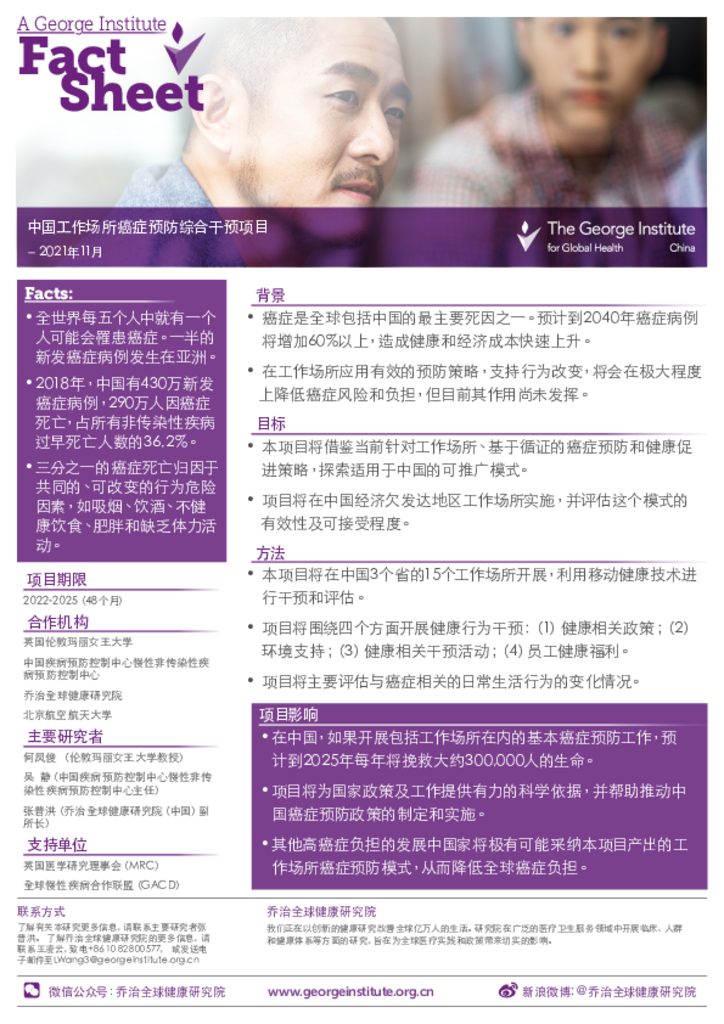
New research targets workplaces to beat cancer
One in five people around the world are likely to develop cancer during their lifetime, and a third of cancer deaths are linked to common modifiable behavioural risk factors. It is of great importance to implement effective health strategies to prevent cancer and help people live a longer and healthier life. A new study aiming to reduce cancer risks by promoting health programs in workplaces will commence in early 2022.
The title of the study is “Comprehensive Workplace Intervention for Cancer Prevention in China”, which is funded by UK MRC and will be a part of the Global Alliance for Chronic Diseases (GACD) research programmes. The study will be jointly implemented by Queen Mary University of London (QMUL), China’s National Center for Chronic and Non-Communicable Disease Control and Prevention (NCNCD), The George Institute for Global Health China (TGI) and Beihang University.
Workplaces offer great potential to promote health and prevent diseases. Involving up to two-thirds of adults, workplaces provide a stable social network for workers and a relatively independent physical environment. In developed countries, health interventions in workplaces have been widely implemented for many years. Low- and middle-income countries (LMICs) are lagging behind in workplace health promotion, particularly for the prevention of cancer, in spite of the fact that 70% of cancer deaths occur in LMICs. If effective workplace interventions for cancer prevention are widely implemented in China, approximately 300,000 lives could be saved annually.
“The burden of cancer is increasing globally. There is an urgent need to identify effective and feasible strategies to prevent cancer. Workplaces offer tremendous opportunities to reduce risk factors, like banning tobacco and alcohol, and to mainstream healthy behaviours, such as the promotion of exercise and healthy diets etc,” said A/Prof Puhong Zhang, Associate Director at The George Institute China and Associate Professor at Faculty of Medicine, UNSW Sydney. “This study can offer policy makers, employers and employees clear insights into how to effectively prevent cancer through the promotion of healthy lifestyles in workplaces.”
The study will target six categories of modifiable risk factors of cancer: dietary factors; behavioural factors; metabolic factors; mental health, environmental factors and infectious agents. To support the implementation of the study, a “Healthy Working” mobile app will be developed to support intervention, evaluation and management. Employers are encouraged to provide supportive policies and an environment conducive to healthy lifestyle promotion. In addition, the study will provide advice on cancer screening for high-risk participants.
This four-year study (2022-2025) will involve approximately 1500 employees from 15 workplaces in 3 provinces in China in the baseline and follow-up surveys. It will employ a stepped wedge design to measure the change in modifiable behavioural risk factors of cancer using an adapted Health Lifestyle Index Score as the indicator. This study will provide evidence and recommendations to the national programmes and policies on health promotion and prevention of cancer in China. If successfully implemented and scaled up nationwide, it will bring great health and economic benefits to workers and their families. This study has great potential to be adopted by other LMICs with a high burden of cancer alongside serious health system challenges, which will lead to a significant contribution to reducing the global burden of cancer.




